
Professor Shinichi Akiyama of the Faculty of Foreign Studies researches Russian grammar. Using a large-scale database, he researches everyday Russian, and talks of how it can be used to develop an understanding of the ideas and beliefs held by Russians—and empower people to engage in tenacious business negotiations.
At university I attended classes on general linguistics. This is a field that explores the characteristics of language through language as a whole, rather than limiting itself to, say, just Japanese or just Russian. As I was studying linguistics, I thought it would be fun to study the characteristics of language through the prism of Russian—and I have been researching Russian grammar ever since.
Russian is from the same family of Indo-European languages as English. Of course, it differs in many respects from English and, in fact, in some aspects it is closer to Japanese. As an example, let us take the English sentence “I have a sister.” While English uses the verb “have”—indicating possession—both Japanese and Russian use the verb “be”—which indicates existence.
Using a database to research everyday Russian

In my research, I use statistical methods to process the data and arrive at my conclusions. More specifically, I frequently access to a large-scale database of text and speech and study Russian grammar.
Russian grammar has many unusual rules. Let us take the sentence “100 students arrived” as an example. In Russian, the subject of this sentence, “100 students,” can be singular or plural—and, in practice, it is more likely to be used in singular form.
In contrast, if the subject was “two students” or “three students,” then it would likely be used in plural form. Although “100 students” is clearly greater in number than “two students,” in Russian “two students” is more commonly taken as a plural subject and “100 students” as a singular subject.
The reason is that in a group of “100 students,” no individuality is ascribed to any of the students; they are understood, instead, to be a singular mass of students. In the case of just two or three students, on the other hand, the focus is on each student as an individual—and multiple individuals are understood as a plural subject.
These are the sorts of everyday language I use my database to investigate.
Understanding Russian ideas and beliefs encourages more tenacious negotiations
Researching Russian not only helps you understand the language, but it also helps you understand Russian ideas and beliefs. It helps you assess questions from literary, cultural, and Russian Orthodoxy points of view: how do Russians as a people think? how do they differ from Ukrainians, with whom they are thought to share many commonalities?
This understanding can be important in business negotiations, too. Often, the negotiating parties say things that suggest no agreement can be made—but thinking about what is being said between the lines and recognizing Russians idiosyncrasies can give you the strength to carry on.
If you take a step back from negotiations, analyze which points the other party will not concede, and patiently adjust your offer, you will assuredly create further opportunities for compromise. Understanding the Russian temperament will prevent you both from giving up too quickly and from holding excessive expectations.
When it comes to studying languages, learning Russian will help you learn neighboring Slavic languages as well. Due to recent developments, there has been a dramatic increase in the number of students wishing to study not only Ukrainian, but Polish, Czech, and other languages from what was formerly called Eastern Europe.
And of course, studying these Slavic languages will also help you understand the ideas and beliefs held by their respective peoples.
The book I recommend
“Kotoba to Bunka”(Language and Culture)
by Takao Suzuki, Iwanami Shinsho

Takao Suzuki is a Japanese linguist. In this book, he analyzes the Japanese language by comparing it to a variety of foreign languages, including Turkish, French, and Russian; in so doing, he encourages Japanese readers to rediscover their mother tongue.
-
Shinichi Akiyama
- Professor
Department of Russian Studies
Faculty of Foreign Studies
- Professor
-
Graduated from the Department of Russian Studies, Faculty of Foreign Studies, Sophia University. He worked at TV Asahi Corporation, then went on to receive his Ph.D. in philosophy from the Graduate School, Division of Regional Culture, Tokyo University of Foreign Studies. After working as an assistant professor, then associate professor at the Department of Russian Studies, Faculty of Foreign Studies, Sophia University, he was appointed to his current position in 2022.
- Department of Russian Studies
Interviewed: November 2022